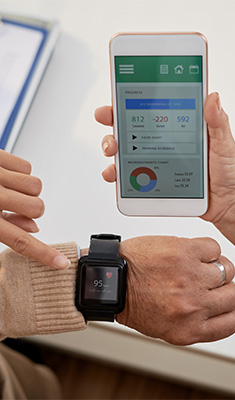

Doug Johnson,
Vice President of Channel Strategies and Partnerships
Some have said that Blockchain in healthcare is a technology solution looking for a problem to solve. And while this is not necessarily false, it also fails to recognize the potential for business innovation where the power of tapping in to a trusted network framework can drive value creation. (For a visual representation of how Blockchain works, go here.)
State of Adoption
Blockchain is not a cure-all for everything that ails the healthcare system. However, it does have the unique ability to bring together trusted data sharing in a disparate and complicated system. The value of established trust, improved access and transparency for near real-time data across healthcare can contribute to better clinical decisions and outcomes, reduce administrative burdens and empower patients to own their health data.
However, there are some, notably The Gartner Group, who believe that Blockchain in healthcare remains years away from mainstream utilization. Their 2019 Hype Cycle for Blockchain Business cites that Blockchain in healthcare is entering the “Peak of Inflated Expectations” portion of the curve. This is not surprising considering the vast amount of attention the technology has received over the past two years.
Gartner also projects it will be more than 10 years before Blockchain in healthcare reaches the “Plateau of Productivity.” Underlying use cases need greater clarity, definition and industry participation to deliver true disruptive advances.
Gartner’s 2019 CIO Agenda Survey also said that 60% of CIOs expect some level of adoption of Blockchain technologies in the coming three years, even though they are uncertain of the impact on their businesses. The survey also said, “… the existing digital infrastructure of organizations and the lack of clear Blockchain governance are limiting CIOs from getting full value with Blockchain.”
So does this mean Blockchain in healthcare is doomed to the scrap heap of hyped technologies? Real-world activity suggests no.
There are several potential use cases that have gained traction as early adopters embrace and attempt to drive disruptive innovation in healthcare using Blockchain. Several categories have generated interest from significant stakeholders in the healthcare industry. While not exhaustive, this list is a snapshot of the types of use cases Blockchain technology aims to address.
Digital Identity Management
Identity is fundamental to almost any Blockchain use case in healthcare, inclusive of identity management of individuals (e.g., patient, participant, provider), unique device identifiers (UDIs) for medical devices in the health supply chain or organizational participants or validators in a network. Organizational participants are organizations participating in a given Blockchain network. Validators are nodes within a network that have the ability to validate blocks before being added to the network. This is specific to the consensus mechanism being used by the Blockchain.
Financials, Insurance & Records
With early distributed ledger technology (DLT) successes seen in the financial technology arena, the escalating cost of healthcare, and the continuing challenges around fraud (particularly from a federal perspective), healthcare finance has well-aligned needs for the characteristics of Blockchain.
Clinical Research & Data Access/Monetization
Recruiting and retention remain two of the biggest challenges in clinical research, and despite innumerable attempts over the years, improvement remains largely unrealized. Clinical trial data sharing and the ability for research participants to experience value discovery (including personal health data monetization) are some of the promises of Blockchain for these uses cases.
Consent Management
Blockchain is positioned to become an essential part of consent management in healthcare, enabling easier sharing of information. Consent is currently stored in individual providers’ electronic health records systems, hospital medical records departments, and in stacks of paper on fax machines. Blockchain technology can enable the storage of patient consent for data exchange and privacy preferences and treatments on the Blockchain so they can be accessed by all stakeholders.
Health Supply Chain Management
Product supplies from inception to end of life are the most prevalent use case for DLT across industries. In healthcare, medication, clinical supplies, blood products and medical devices are examples where Blockchain is being leveraged for operations, compliance and forecasting among pharmaceutical manufacturers, blood banks, providers, pharmacies and payers.
In addition, the examples below provide real-world evidence of how Blockchain is helping forward-thinking organizations reimagine business processes.
Synaptic Health Alliance: Provider directory/credentialing
Humana, MultiPlan, Optum, Quest Diagnostics and United Healthcare have formed the Synaptic Health Alliance to explore the use of Blockchain technology to tackle accurate and efficient provider data management and sharing. This new healthcare alliance is unique in its member composition and among the first to have a national footprint.
REMEDICHAIN: Pharma supply chain
Remedichain accepts donated prescription medication and puts it in the hands of patients who could not otherwise afford it. Remedichain is developing a Blockchain solution to address the financial and environmental problems of prescription waste.
Change Healthcare: Claims Processing
Change Healthcare runs a Blockchain that processes 30 million transactions a day. The company plays a crucial role in the U.S. healthcare sector as a clearinghouse for insurance claims for healthcare providers and insurers as clients.
Rymedi – Electronic Health Records
The FDA approved Rymedi’s pilot testing implementation of the Drug Supply Chain Security Act for specialty medicines across health systems with partners: Indiana University Health, WakeMed Hospitals and Health, Temptime/Zebra, Good Shepherd Pharmacy/Remedichain, the Center for Supply Chain Studies and the Global Health Policy Institute.
To learn more, the HIMSS Blockchain in Healthcare Task Force has authored a comprehensive content library on Blockchain in healthcare that should be required reading for those interested in gaining a solid overview of the technology.



